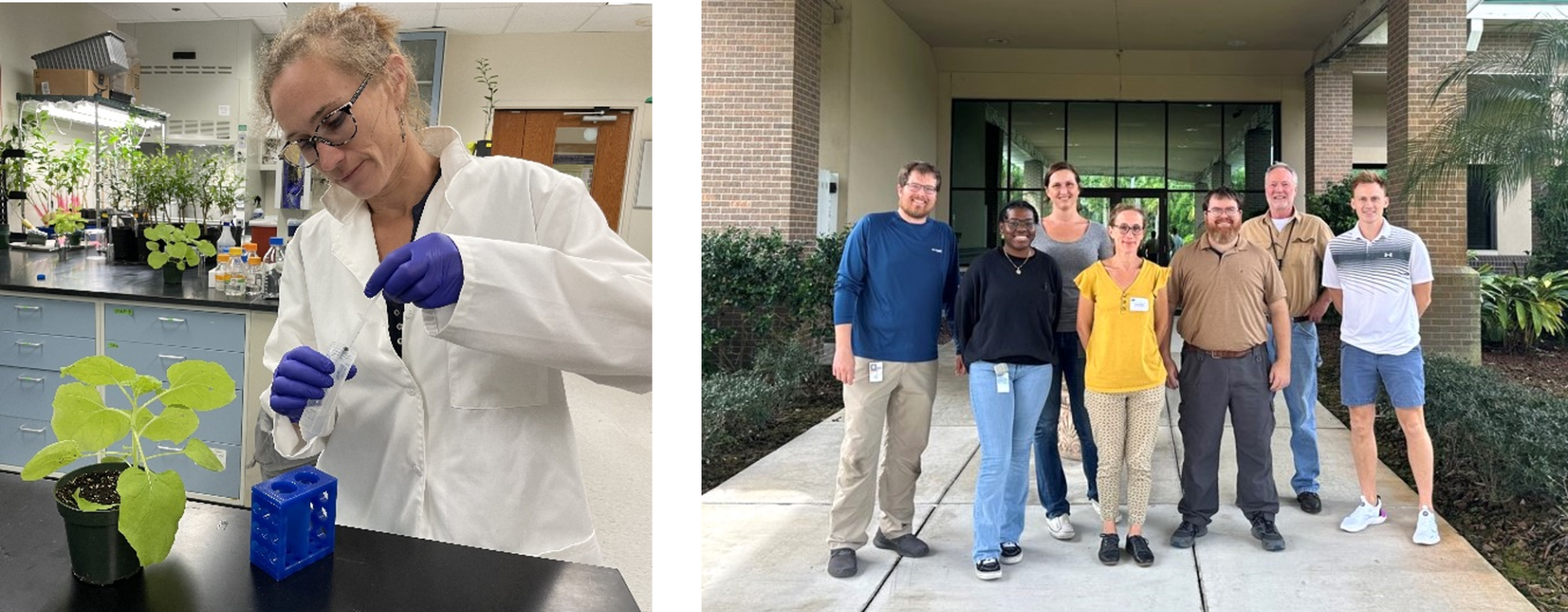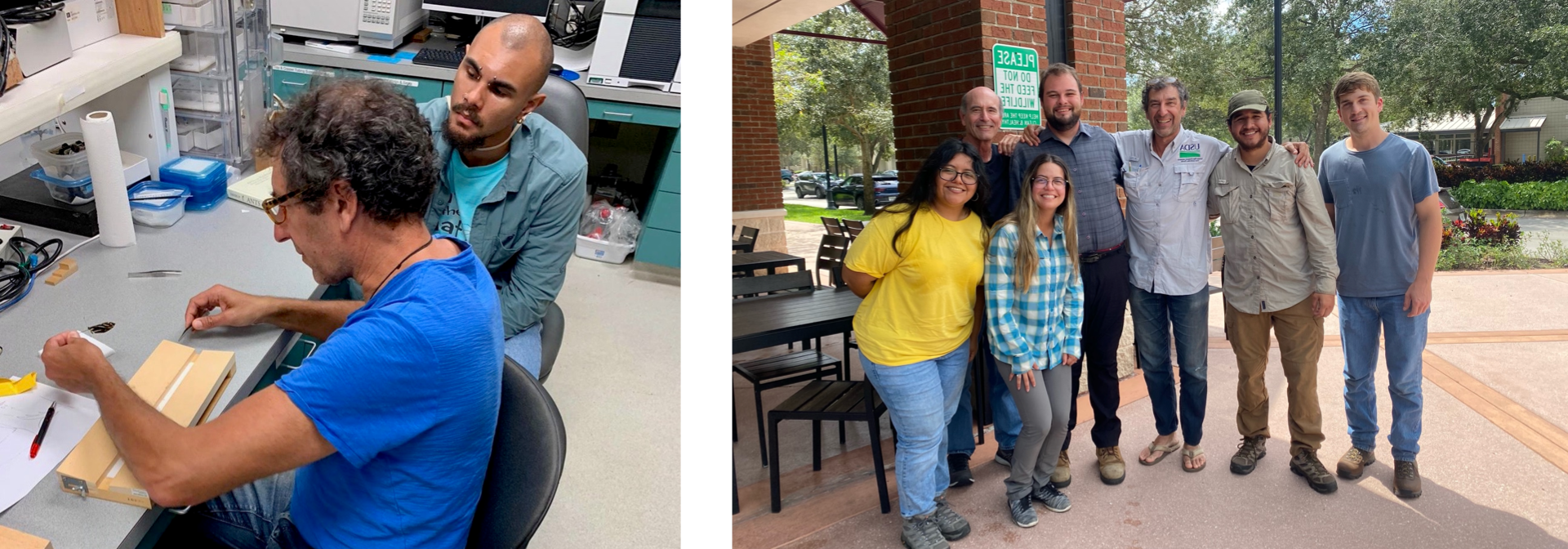EBCL Scientists Benefiting of International Research Detail Grants to Initiate Partnerships in the U.S.
By M. Tannières & RFH Sforza
In fall 2023, Mélanie Tannières, a research phytopathologist, and René FH Sforza, a research entomologist, two scientists from the USDA ARS European Biological Control Laboratory, were given for the very first time the great opportunity to do an International Research Detail (IRD) in ARS laboratories. The objectives of IRD to ARS locations in the United States are to create new opportunities for USDA ARS Overseas Biological Control Laboratories (OBCL) scientists, to provide collaboration opportunities for ARS scientists, and expand the linkages between ARS and OBCL research projects in the United States.
Mélanie Tannières, visited the U.S. Horticultural Research Laboratory (USDA-ARS) in Fort Pierce, Florida to work on an innovative approach combining antimicrobial peptides and a delivery system based on Agrobacterium tumefaciens to combat insect-transmitted plant vascular diseases. The goal of this IRD was to acquire skills and knowledge to adapt this strategy for the control of Xylella fastidiosa, the causal agent of Pierce’s disease in grapevine in North America, citrus variegated chlorosis in South America (and threatening to move into the U.S.), and olive quick decline syndrome, notably in Southern Italy. As there is currently no method that effectively prevents or cures host plants from infection, there is a need for new and safe biological solutions for Xylella fastidiosa disease management, and the SymbiontTM technology opens exciting new research avenues in the field of insect-transmitted plant vascular disease. She discussed with Dr Shatters’ team about antimicrobial peptides that could be tested against Xylella fastidiosa, protocols, and the optimization of Agrobacterium strains. In addition, she gave a seminar at the USDA-ARS-HRL about her past experiences and her research project on Xylella fastidiosa.
René FH Sforza spent a bit more than two weeks at the USDA-ARS IPRL (Invasive Plants Research Laboratory) in Davie, FL with Dr. Gregory Wheeler to jointly work on the invasive cogongrass (Imperata cylindrica-Triticeae). Main objectives were to conduct a survey in southeast USA, where it is highly invasive, for understanding the spread of this grass and make collections for DNA samples, to discuss an experimental plan for testing future natural enemies, and to make connections with the local staff for future collaborations. Dean Brookes (USDA-ARS Brisbane, AUS) also joined the trip. Thirteen populations were collected for future DNA analysis by Dr. Brookes. Plant rhizomes were also collected for growing at the IPRL. The whole trip totaled 1,500 miles. It was a very exciting trip with very fruitful scientific discussions amongst the three scientists. This international research detail was also an opportunity to gain knowledge about other weeds studied at the IPRL like water hyacinth with Dr Melissa Smith's team. A trip to set up an experiment on Okeechobee lake was organized. In addition, Dr. Sforza gave a seminar at the University of Florida entitled "Exploration for classical biological control: a taste from the Old World". Finally, Dr. Sforza gave a training session to Dr Wheeler's team on how to prepare and mount insects depending on the insect orders and sizes. Dead material was collected from the campus: locusts, butterflies, moths, scarabeids. A group of six people was trained and seemed to really enjoy this new activity.
As a result, OBCL will surely benefit from these IRD by expanding their research activities and collaborations.
 (Left) Mélanie Tannières working in the lab (Right) The host team at the U.S. Horticultural Research Laboratory (USDA-ARS) in Fort Pierce, FL
(Left) Mélanie Tannières working in the lab (Right) The host team at the U.S. Horticultural Research Laboratory (USDA-ARS) in Fort Pierce, FL
 (Left) René FH Sforza showing how to mount a butterfly (Right) The host team working on cogongrass at the U.S. IPRL in Davie, FL
(Left) René FH Sforza showing how to mount a butterfly (Right) The host team working on cogongrass at the U.S. IPRL in Davie, FL
For inquiries regarding this article contact: ebcl@ars-ebcl.org.
The European Biological Control Laboratory (EBCL) was established in 1991 near Montpellier, France. EBCL was created by the merger of the former European Parasite Laboratory, established in Paris in 1919, and the Biological Control of Weeds Laboratory in Rome. EBCL has a satellite laboratory in Thessaloniki, Greece. As the only USDA ARS-operated laboratory outside the United States, EBCL develops biological control technologies which can be used to suppress invading weeds and insect pests of Eurasian origin. EBCL researchers do this by searching for natural enemies (insects, mites, and pathogens) in their native habitat, determining their identity, testing their host specificity and potential impact in laboratory and field experiments, and shipping promising organisms to the U.S. for further testing as biological control agents. EBCL collaborates with scientists in many countries in Europe, Asia, and Africa to explore in regions of origin of the target weeds and insects.
